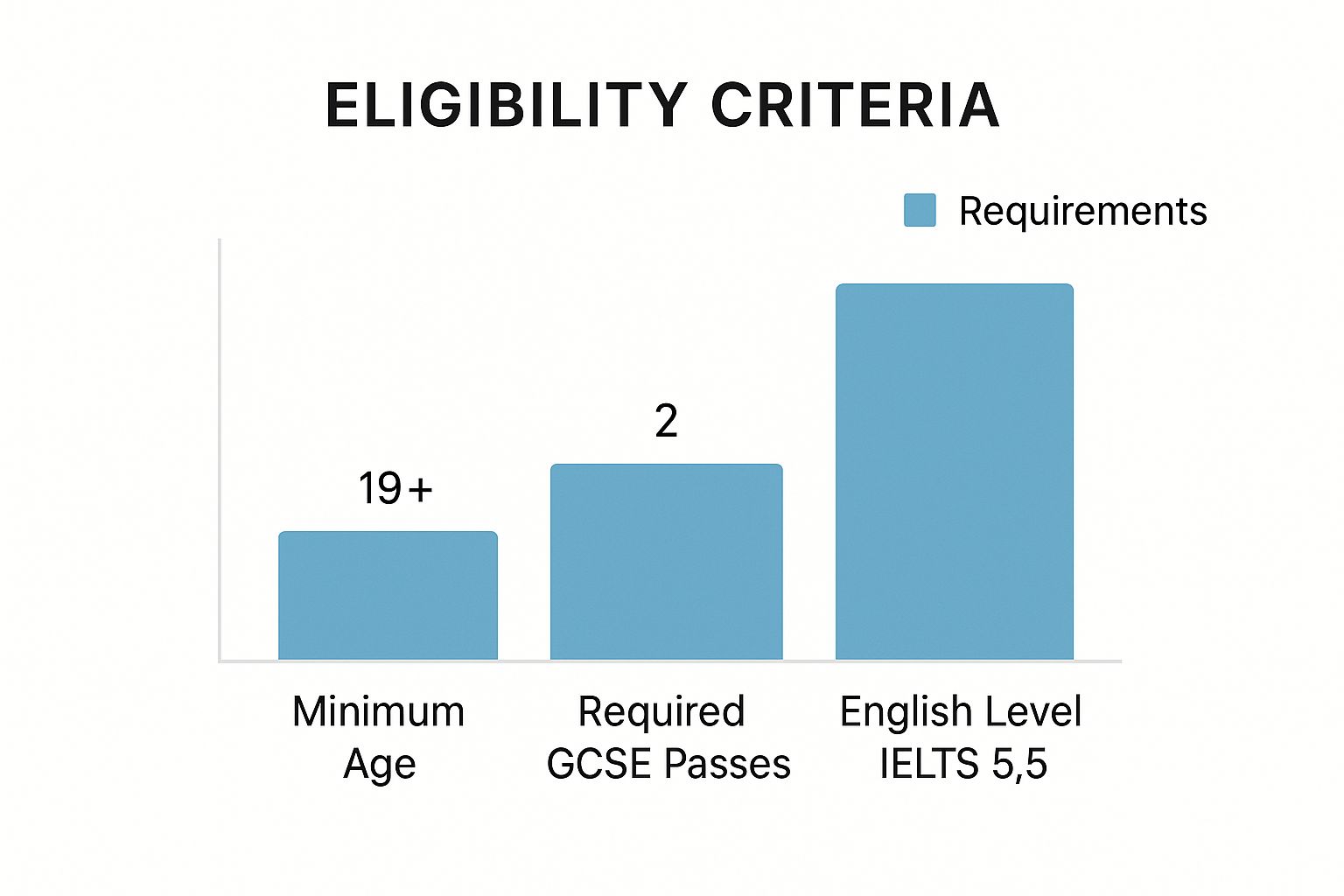Feeling a bit lost on how your Access to Higher Education (HE) Diploma fits into a university application? You're not alone. The great news is your Access to HE Diploma is your direct route to a degree, and it works by turning all your hard work into UCAS Tariff points – the currency universities use for admissions. It’s a clever system that lets them compare your qualification with others, like A-levels, on a level playing field.
Your University Journey Starts Here

If you're wondering how an Access course can get you into uni, you've come to the right place. This guide is all about clearing up the confusion and showing you just how powerful this qualification is for opening doors to higher education.
Think of this as your personal roadmap. We’re going to break down exactly how your module grades—those Passes, Merits, and Distinctions—add up to a real, tangible UCAS points total. Getting your head around this is the first big step towards building a killer university application and chasing your dream degree with confidence.
Understanding The Basics
First things first, the Access to HE Diploma is a Level 3 qualification, which puts it right on par with A-levels. It's specifically designed for adult learners who might not have taken the traditional route through education. The whole course is built around credits:
- Total Credits: You'll complete 60 credits in total to finish your diploma.
- Graded Credits: Out of these, 45 credits are graded at Pass, Merit, or Distinction. These are the ones that count towards your UCAS points.
- Ungraded Credits: The final 15 credits usually focus on academic study skills and aren't graded, but they're vital for getting you ready for uni life.
This structure doesn't just fill your head with subject-specific knowledge; it gets you properly prepared for the demands of studying at degree level. By the end of it all, you'll have a clear score that shows admissions tutors across the UK exactly what you’re capable of.
What Are Access Course UCAS Points?

If you're thinking about university, you’ve probably heard the term UCAS Tariff points thrown around. What are they? Think of them as a universal translator for your qualifications.
Universities receive applications from students with all sorts of backgrounds – A-levels, BTECs, and of course, Access to HE Diplomas. UCAS points create a simple, numerical system that puts everyone on a level playing field, making it easy for admissions tutors to compare different qualifications fairly. It’s how your hard work on an Access course gets the recognition it deserves.
How Your Grades Become Points
Your Access to HE Diploma is made up of 60 credits. The ones that really count for your UCAS application are the 45 graded credits. These are the modules where your work is marked as a Pass, Merit, or Distinction.
It’s a bit like collecting points in a video game. Every Distinction you earn is a major score, a Merit is a solid achievement, and even a Pass adds to your overall total. The goal is to rack up as many high-value points as possible.
The other 15 credits are ungraded and are designed to build up your essential study skills. So, your final UCAS point total comes from the unique combination of Passes, Merits, and Distinctions you achieve across those 45 key credits. This is the number that universities will look at.
Understanding the structure of an Access course is the first step, as it’s the foundation for earning these all-important points.
Translating Grades to a UCAS Score
So, what do these grades actually look like in numbers? The system is designed to be equivalent to other qualifications, like A-levels. If you ace your course and achieve 45 Distinctions, you'll earn a massive 144 UCAS points – the same as getting three A* grades at A-level.
On the other end of the scale, getting 45 Passes will give you 48 points. A strong performance with 45 Merits lands you right in the middle with 96 points. Knowing these values helps you track your progress and see exactly what you need to aim for to meet the entry requirements of your dream university.
How to Calculate Your UCAS Points
Trying to figure out your UCAS points from your Access to HE Diploma grades can feel a bit like cracking a code, but it’s actually much more straightforward than it looks. The whole calculation hinges on the 45 graded credits you earn. The other 15 ungraded credits don't factor in here, so you can set those aside.
Everything comes down to the grades you get for those 45 credits: Distinction, Merit, or Pass. A higher grade is worth more points, so the more Distinctions and Merits you rack up, the healthier your total will be. It’s a really clear system that shows you exactly how your hard work on each module adds up to a stronger university application.
This infographic gives a quick rundown of what you need to get started on an Access to HE Diploma in the first place.

As you can see, the course is built for adult learners, putting the right academic foundations in place to make sure you're ready to hit the ground running at degree level.
Mapping Your Grades to Points
So, how do you turn those grades into a final score? The secret is knowing what each grade is worth. While there's a complex formula running in the background, UCAS provides a tariff table that does all the heavy lifting for you. It's best to think of it as a simple conversion chart.
For example, if you absolutely smash your course and get 45 credits all at Distinction, you’ll walk away with the maximum 144 UCAS points. To put that in perspective, that’s the same as achieving three A* grades at A-level, which shows just how valuable universities consider a top-performing Access student to be.
On the other end of the scale, getting 45 credits at Merit bags you 96 UCAS points, and 45 Pass credits will give you 48 points. Of course, most students end up with a mix of all three.
Let's look at a realistic goal for someone aiming for a competitive course:
- University Offer: The course asks for 120 UCAS points.
- What You Need: To hit that target, you could aim for a profile of 30 credits at Distinction and the remaining 15 at Merit. That combination gets you exactly 120 points.
Access to HE Diploma UCAS Tariff Points Calculator
To make this even clearer, the table below shows how different combinations of grades translate into UCAS points. It’s a great way to visualise your targets and see how every single grade counts.
| Distinction Credits | Merit Credits | Pass Credits | Total UCAS Points |
|---|---|---|---|
| 45 | 0 | 0 | 144 |
| 30 | 15 | 0 | 120 |
| 15 | 30 | 0 | 96 |
| 0 | 45 | 0 | 96 |
| 15 | 15 | 15 | 80 |
| 0 | 30 | 15 | 80 |
| 0 | 15 | 30 | 64 |
| 0 | 0 | 45 | 48 |
This table gives you a snapshot of some common grade profiles, but remember there are many other combinations possible. Your final score will depend entirely on your unique mix of achievements across those 45 graded credits.
Use the Official UCAS Calculator
While it’s good to understand the basics, you definitely don’t need to get out a notepad and calculate all this by hand. The official UCAS Tariff Calculator is a fantastic tool that takes all the guesswork out of it.
You just pop in the number of Distinction, Merit, and Pass credits you think you’ll get, and it instantly shows your total points. We really recommend having a play around with it. Seeing how a few more Distinctions could push you into the next points bracket can be a huge motivator and helps you set clear, ambitious goals for your studies.
Decoding University Entry Requirements

Once you’ve got a handle on how to calculate your access course ucas points, the next step is figuring out what universities are actually looking for. Entry requirements aren't a one-size-fits-all deal; they can change dramatically between different institutions and even between specific degree courses.
This variation is completely normal and just reflects the huge diversity of courses on offer. For instance, some universities might state their offer as a total number of UCAS points. This is great because it gives you flexibility in how you get there, using different combinations of Distinction, Merit, and Pass grades.
Others, however, can be much more specific, particularly for competitive subjects like nursing or the sciences.
Points vs Specific Grades
You'll quickly notice that universities tend to make two main types of offers for Access to HE students, and it’s vital to understand the difference. Getting this right is the key to targeting courses where you have the best chance of success.
- A Total UCAS Points Requirement: An offer might simply be "112 UCAS points." This means as long as your grades add up to 112, you've met the academic condition. Simple as that.
- A Specific Grade Profile: An offer could be far more precise, something like, "Achieve 30 credits at Distinction and 15 credits at Merit." Here, hitting that exact grade breakdown is what matters, not just the total points.
This second type of offer shows that the university places a high value on top performance in modules they see as most relevant to the degree.
It’s absolutely crucial to read the entry requirements on the university website carefully. They will always spell out exactly what they expect from Access to HE Diploma applicants, leaving no room for guesswork. Knowing this helps you apply strategically.
The range of what's required across the UK is wide. Some courses, especially those with a foundation year, might ask for as little as 32 UCAS points. On the other hand, you’ll see many popular degrees asking for 104 points or more for direct entry.
Ultimately, your Access course opens doors to a massive variety of universities, including some of the very best. With the right grades, you can position yourself as a strong candidate for even the most competitive degrees. You can find out more by checking out our guide on getting into a top university with an Access course.
Strengthening Your University Application
Your total of Access course UCAS points is a crucial part of your university application, but let's be honest – it’s only one piece of the puzzle. A truly standout application tells a compelling story about who you are and why you’re absolutely ready for degree-level study. This is your chance to shine beyond the numbers.
The best place to do this is in your personal statement. Think of it as the bridge connecting your life experience with your academic achievements. An Access course gives you so much more than just subject knowledge; it builds incredible resilience, sharpens your independent research skills, and proves you can manage your time like a pro. These are the exact qualities university admissions tutors get excited about.
Showcasing Your Unique Strengths
Don’t just list your skills – bring them to life with real examples. Talk about how you juggled your studies with work or family commitments. Describe a specific research project that ignited your passion for the subject. This kind of narrative shows you’re not just a student; you're a dedicated and mature individual who knows what they want.
Your Access to HE Diploma proves you have the academic ability, but your personal story demonstrates your commitment. Frame your life experiences not as a gap in your education, but as the very thing that makes you a more focused and motivated candidate.
Remember, many universities actively seek out Access to HE students. Why? Because they bring diverse perspectives and a rock-solid work ethic to campus. When you're shortlisting universities, keep an eye out for those that explicitly mention the Access Diploma in their entry requirements – it's a great sign they value what you bring to the table.
Preparing for the Next Steps
Once you’ve got your application ready, a little extra preparation goes a long way. Make sure to tailor your personal statement for each specific course you apply to; it really shows you've done your homework. And if a course requires an interview, take some time to practise talking about how your unique journey has prepared you for success.
For more guidance on making your application stand out from the crowd, you can explore our top tips for applying through UCAS, which provides even more insights into crafting a submission that gets noticed.
Common Questions About Access Course Points
Even after getting to grips with how the tariff system works, it’s completely normal to have a few questions about how your Access course points will work in the real world. Let's tackle some of the most common queries we hear, so you can feel totally confident when it’s time to finalise your university application.Think of this as a quick-fire round to settle those last-minute "what if" thoughts. Getting straight answers means you can move forward with certainty.
Do All Universities Accept Access Diplomas?
The short answer is yes – the vast majority of UK universities recognise and welcome the Access to HE Diploma. It's a nationally respected qualification specifically created to get adult learners into degree-level study.
However, and this is important, you must always double-check the specific entry requirements for your chosen course. Some highly competitive degrees, like Medicine or Veterinary Science, can have very particular demands and may prefer A-levels. A quick visit to the course page on the university’s website will give you the definitive answer.
How Do Access Points Compare to A-Levels?
This is where the UCAS Tariff system really shines. It's designed to create a fair and direct comparison, meaning all the hard work you put into your Access course is valued just as much as traditional qualifications.
For example, getting 45 credits at Distinction on your Access diploma gives you 144 UCAS points. That's the exact equivalent of a student achieving three A* grades at A-level. Or, a profile of 30 Distinctions and 15 Merits translates to 128 points, the same as AAB at A-level.
This system ensures that admissions tutors can assess every applicant on a level playing field, no matter what their educational background looks like.
What If I Miss My Required Grades?
If you just miss the grades for your firm or insurance choice, the first rule is: don't panic. The very first thing to do is log in to UCAS Track. Universities can sometimes be flexible and might accept you anyway, especially if you were close.
If they can't offer you a place, you will automatically be entered into UCAS Clearing. This is a well-oiled system that matches students to courses that still have places available. Plenty of fantastic universities have spots open through Clearing, and they are very familiar with assessing students holding an Access to HE Diploma. It’s a brilliant second chance to secure your place at university.
At Access Courses Online, we provide accredited, flexible diplomas designed to fit around your life. Our expert tutors are here to guide you through every module, helping you achieve the UCAS points you need for your dream degree. Explore our courses and start your university journey today.

